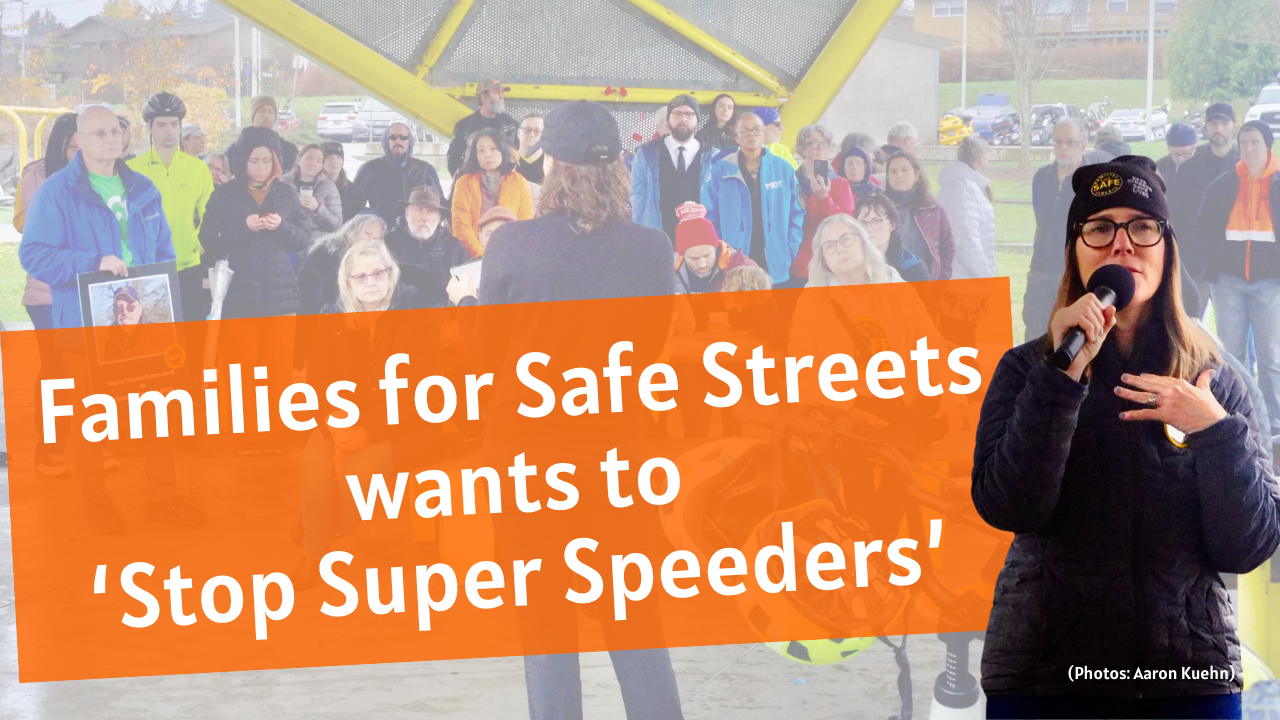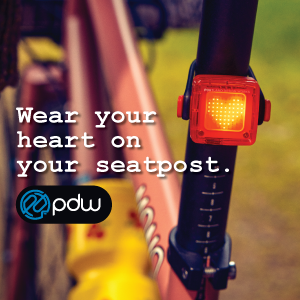Yesterday, on a cold and rainy Sunday morning, elected officials, advocates and survivors of fatal and serious injury traffic crashes gathered at Luuwit View Park in East Portland. They came together for the annual World Day of Remembrance for Road Traffic Victims, a global event that holds space for people who’ve made the ultimate sacrifice in the war against traffic violence.
The event was organized by Families for Safe Streets Portland, the local chapter of a national organization that raises awareness and pushes for policies that make roads safer. FSS Portland is an all-volunteer group on rise thanks to dedicated leaders like Sarah Risser (whose work on memorial signs I recently profiled) and Michelle DuBarry. Both of these women share an unwanted bond: they lost their sons to traffic violence.
I wasn’t at Sunday’s event, but I spoke with DuBarry this morning. I wanted to hear how it went and learn more about an exciting development in her work: FSS Portland and their coalition of partners plan to lobby the Oregon Legislature for a bill that would install speed-limiter technology inside the car of drivers who repeatedly speed. Dubbed “Stop Super Speeders,” the campaign has already led to new laws in Virginia and Washington and is proposed in nearly a dozen other states.
Below is the text of my conversation with DuBarry. You can also watch the interview in the player above or on YouTube.
Jonathan Maus: What was your role in the World Day of Remembrance on Sunday and what is the point of the event?
Michelle DuBarry: I am the board chair for the Portland chapter of Families for Safe Streets. We partnered with, Portland Bureau of Transportation, The Street Trust, Bike Loud, Portland Parks and Recreation, 1000 Friends of Oregon and Oregon Walks. Our event is intended to honor everyone who has been injured in a traffic crash and to support survivors and grieving families. It’s a memorial event, but there’s an advocacy component.
Jonathan: Take me to the event. What happened there and how could attendees participate?
Michelle: Everyone who is there as a member of Families for Safe Streets had a sign with a photo of their loved one and their age. Those signs were set around the little pavilion. Some of the family members held the signs and there were flowers. There was a small altar where anyone could light a candle to honor somebody who’s been impacted by traffic violence. It was very cold and and it was raining, but I think that makes it even more meaningful to those of us who have lost family members… Just knowing that people brave the weather on a Sunday morning to spend time with us and support is really, really meaningful to us.
Jonathan: It’s somber and said, but you mentioned that it’s also hopeful. Why would this actually be a hopeful event in some ways?
Michelle: I think that all of us who do this work are really motivated by not wanting other people to experience what we’ve experienced, and the knowledge that there is or there are solutions that just aren’t being used because of lack of political will and lack of money — it’s frustrating.
So raising awareness and letting people know that there is a path forward to prevent traffic violence, engaging our political leaders, building support on the ground so that we can actually create momentum for potential solutions, is really exciting.
The other thing I should mention about the event is… We try to center our own members, so a lot of our will share their stories. It’s incredibly powerful. It’s really sad. This year we had a couple of folks who are new to families for Safe Streets and so having them there was very powerful. There was one woman who had just lost her fiancé nine days ago and managed to show up for the event and is looking to get involved with our group.
The idea that somebody can show up for an event like that after going through something so tragic, I think it’s sad, but it also demonstrates incredible hope.
Jonathan: It demonstrates a lot too to the elected officials that show up and I saw there were several at this event. I think more, more so than usual. Is there anything about what an elected official said that stood out to you?
Michelle: I was really moved by Dacia Grayber, a state representative. She’s a paramedic for her day job and so I think that she understands on a very deep level what the impact of traffic violence is for victims and families. I felt like she gave a really powerful speech from her heart.
City Councilor Jamie Dunphy was there too, and he’s been pretty vocal in recent weeks talking about traffic violence because he’s had three constituents who were killed in crashes in a matter of a few days [actually one day]. And the event was held in his district in East Portland where we know that traffic violence is a more serious problem. So it was really meaningful to have him there both as a resident and as a city councilor.
We heard from State Representative Mark Gamba. We heard from Thuy Tran, who’s also a state representative. Both of them spoke really movingly in support of what we’re doing. And obviously Tiffany Koyama Lane city councilor from District 3, who’s been a big champion of Vision Zero on the council, gave a really wonderful speech.
Jonathan: Remembering people that have been killed in traffic and holding space and bringing these people together is really important; but you also want to actually do something about it. What is this I hear about new legislation regarding speeding that you’re working on?
Michelle: The legislation is called Stop Super Speeders and it is a bill that would require repeat offenders or people who have very serious reckless driving or speeding convictions to install technology in their vehicle known as intelligent speed assist (ISA). It uses GPS, digital maps and road sign recognition cameras to prevent a vehicle from going over the posted speed limit. It’s kind of similar to the technology that prevents impaired drivers from driving.
Jonathan: Is it modeled after the effort in New York? Isn’t there a New York State Assembly person working on this?
Michelle: They haven’t passed a bill in New York yet. But there’s a lot of momentum there. The states that have passed laws are Virginia and Washington and Washington DC has also passed a law and they’re broadly similar. I think there are some details that are different that will need to be worked out in Oregon, such as; what’s the threshold for mandating someone install ISA?
But the great thing about this legislation and why I think it will earn support from a broad spectrum of leaders is it replaces the need to suspend driver’s licenses — which is not a effective strategy for reducing crashes. We know that people who are convicted of these offenses, who have their driver’s licenses suspended, usually keep driving. And so this technology allows people to continue to drive so they can go to work so they can keep participating in society. They just can’t speed.
Jonathan: Wow. Okay. I didn’t realize it was actually in place in some states already. Interesting to know you’re working on that. What’s the timeline or the next steps on the super speeder legislation?
Michelle: Right now we’re planning for the 2027 session. So we’ll spend the next year or so gathering sponsors and hammering out the details of the legislation.
Jonathan: Your group’s been like busy in other ways too. Tell folks about the new website.
Michelle: Our new website is pdxfamiliesforsafestreets.org. My colleague and my friend Sarah Risser, has really led the charge on getting this website set up and she found a nonprofit who was willing to donate their time and we just launched it. It’s a really beautiful website. It has a section, with memorials for victims, so anyone who’s lost a family member or a loved one — or who has been injured in a crash — is welcome to send us a photo and share a little bit about what happened to them. And we have this online memorial space, which is really nice. There’s also information about our advocacy both at the state and the city level. We’re hoping the website can be a place where people can go for information on the legislation that we’re hoping to pass. You can sign up for our emails, you can donate. It’s just in the last month that we’ve had that kind of capability, so it’s really exciting!
But we are a fully volunteer organization. We don’t have any staff. We don’t have a budget. And so we’re, we’re hoping to get, you know, a small trickle of donations coming in just so that we can pay for things like storage and Zoom membership and our email listserv, things like that.
Jonathan: Is there anything else you want to add about the work you’re doing or anything we haven’t talked about yet?
Michelle DuBarry: The only thing I would say is that World Day Remembrance is a really hard event. As someone who’s lost a son in traffic violence, it’s a difficult event. But the connection to the community is really healing in a lot of ways. Feeling connected to people not only in Portland, but across the country and across the world is really powerful and I think it really does drive increased awareness — and hopefully, political change.
Jonathan: Thanks so much for sharing it with us, Michelle. And thanks for all the work you’re doing.
Michelle: Thank you.




